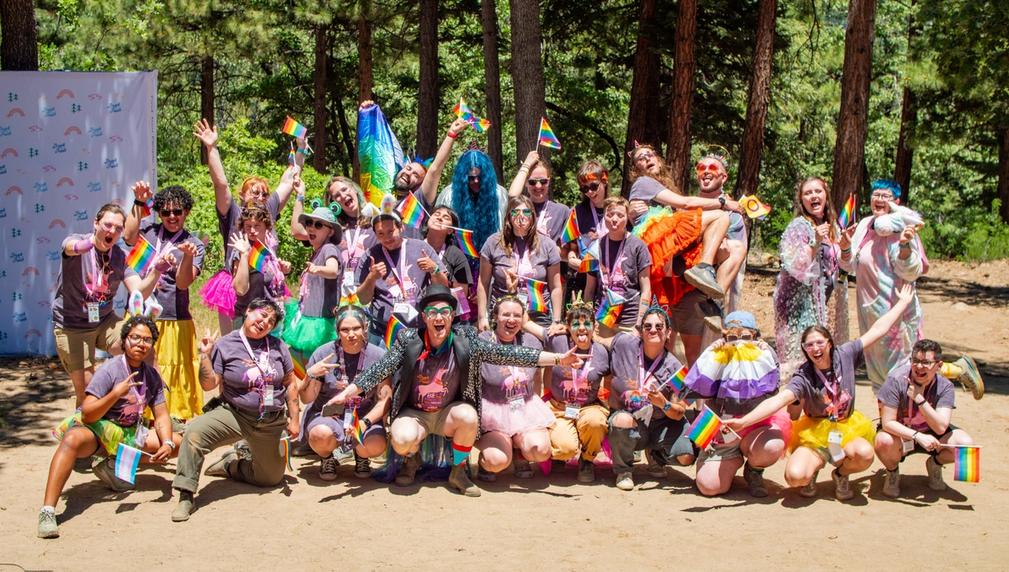Helping LGBTQ+ Youth Thrive in Community and Outdoors
At Brave Trails we believe LGBTQ+ youth deserve safe spaces to grow, create, and learn. We believe that there should be equal access to the great outdoors, and that nature is an important component of healing for marginalized communities. Over the next year, we are expanding our leadership development, social justice, and environmental sustainability programming to better serve BIPOC (Black, Indigenous, and people of color) youth, youth in rural communities, and youth dealing with mental health issues.

What is the primary issue area that your application will impact?
Social support networks
In what stage of innovation is this project, program, or initiative?
Expand existing project, program, or initiative (expanding and continuing ongoing, successful work)
What is your understanding of the issue that you are seeking to address?
Queer youth are facing harassment at home and school, and persecution at the hands of their government. Since the beginning of 2024, nearly 500 anti-LGBTQ+ state laws have been introduced in 46 states, per the ACLU. According to the Human Rights Campaign, greater than 30% of transgender youth aged 13-17 live in states that, through the middle of 2023, have enacted bans on gender-affirming care. LGBTQ+ youth need safe and nurturing environments that help them develop a strong self-identity and the skills to fight for themselves and other marginalized people. In addition, economic inequality and historical and present-day overt/covert racial violence have perpetuated a diversity gap in the outdoors. Youth who live in urban areas, underserved and disadvantaged communities, and low-income backgrounds would otherwise not have access to programs like Brave Trails.
Describe the project, program, or initiative this grant will support to address the issue.
Our programming and our community of LGBTQ+ professionals allow us to offer unique experiences for LGBTQ+ youth in a nurturing community that helps them define their own futures and become self-advocates, community leaders, and environmental stewards. We are fully committed to providing LGBTQ+ youth access to the outdoors and ensuring they are given the tools to not only be good leaders, but to be protectors of the natural environment and to feel safe in those spaces.
Through year-round programming, like Brave Trails’ Youth Camp, Brave Trails’ Family Camp, Brave Space Meetups, our Mental Health Program, and our Backpacking Adventure Program, Brave Trails will provide:
Educational and personal development opportunities on a wide variety of subjects, including leadership, public speaking, skillful communication, activism, and navigating the transition from high school to postsecondary education or employment;
LGBTQ+ youth—many of whom live in urban areas—with rare opportunities for outdoor adventure and environmental education;
A safe space for youth to connect with their peers and mentors; Access to mentors and local leaders in the LGBTQ+ community and beyond;
Campers ways to stay connected with other youth to build their support network; and
Mental health support that encourages resilience and helps youth develop positive coping skills.
Describe how Los Angeles County will be different if your work is successful.
In a county that is 48% Hispanic or Latinx, where 13.7% of the population lives below the poverty line, and much of the land is either urban or suburban, our programming will directly impact the lives of numerous county residents. Though we serve LGBTQ+ youth from all over the world, Los Angeles County residents who attend Brave Trails will return to their communities as leaders who can have a valuable impact on the way Los Angeles County functions. In addition, our Mental Health Program serves only those LGBTQ+ youth who reside in California. Most of those youth reside in Los Angeles County.
What evidence do you have that this project, program, or initiative is or will be successful, and how will you define and measure success?
Brave Trails continually seeks ways to achieve our mission of helping LGBTQ+ youth and their families find their people, place, and passion. To do so, we measure quantitative and qualitative impacts of programming by collecting data to track the number of youth served as well as how participants rate our activities. We conduct pre- and post-camp evaluations that include questions related to mental health, identity, leadership, and self-esteem. Dr. Traci Gillig, a professor of communication at Washington State University who studies psychological and social factors that affect the wellbeing of youth, develops and conducts participant surveys. She reviews evaluations and compiles camp attendee outcomes each year. These evaluations help Brave Trails improve camp activities and respond to campers’ suggestions for future programming and address any unmet needs. And, even as we strive to improve year after year, we are encouraged by how positive the feedback has been since our founding.
Approximately how many people will be impacted by this project, program, or initiative?
Direct Impact: 450.0
Indirect Impact: 800.0